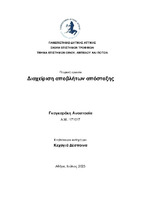| dc.contributor.advisor | Κεχαγιά, Δέσποινα | |
| dc.contributor.author | Γκαγκαράκη, Αναστασία | |
| dc.date.accessioned | 2023-09-08T08:23:20Z | |
| dc.date.available | 2023-09-08T08:23:20Z | |
| dc.date.issued | 2023-07 | |
| dc.identifier.uri | https://polynoe.lib.uniwa.gr/xmlui/handle/11400/5031 | |
| dc.identifier.uri | http://dx.doi.org/10.26265/polynoe-4869 | |
| dc.description.abstract | Το θέμα της παρούσας πτυχιακής εργασίας είναι η διαχείριση των αποβλήτων απόσταξης ποτοποιίας. Η νομοθεσία που αφορά τη διαχείριση αποβλήτων στην Ευρωπαϊκή Ένωση και στα κράτη μέλη της είναι αυστηρή. Θέτει νόμους που αφορούν τη μείωση των παραγόμενων αποβλήτων, την αύξηση της ποσότητας των υποπροϊόντων και παραπροϊόντων αλλά και προδιαγραφές που αφορούν τα χαρακτηριστικά των αποβλήτων που θα διαθέτουν τελικά στο περιβάλλον. Σκοπός είναι η προστασία του περιβάλλοντος και της ανθρώπινης υγείας. Η απόσταξη είναι μία από τις πιο παραδοσιακές μεθόδους διαχωρισμού ενός μίγματος στα επιμέρους συστατικά του. Η παραγωγή των αλκοολούχων ποτών γίνεται κυρίως σε χάλκινους άμβυκες και τα αποβαλλόμενα απόβλητα έχουν μεγάλο όγκο και είναι πλούσια σε οργανικά και θρεπτικά συστατικά, αλλά και μεταλλικά στοιχεία, έχουν υψηλή θερμοκρασία, χαμηλό pH και σκούρο χρωματισμό. Μπορούν να εφαρμοστούν στο έδαφος ως λίπασμα, να αποβληθούν στο περιβάλλον, μετά από κατάλληλη επεξεργασία, να μετατραπούν σε ζωοτροφές, κομπόστ ή καύσιμη ύλη, να χρησιμοποιηθούν για την απομόνωση και ανάκτηση βιοδραστικών ουσιών,. Η επεξεργασία των αποβλήτων περιλαμβάνει βιολογικές, φυσικοχημικές και θερμικές διεργασίες όπως αερόβια ή αναερόβια χώνευση, πήξη, καύση. Από τα απόβλητα μίας ποτοποιίας μπορούν να ανακτηθούν πολυφαινόλες, πολυσακχαρίτες και πτητικά λιπαρά οξέα. | el |
| dc.format.extent | 60 | el |
| dc.language.iso | el | el |
| dc.publisher | Πανεπιστήμιο Δυτικής Αττικής | el |
| dc.rights | Αναφορά Δημιουργού - Μη Εμπορική Χρήση - Παρόμοια Διανομή 4.0 Διεθνές | * |
| dc.rights.uri | https://creativecommons.org/licenses/by-nc-sa/4.0/deed.el | * |
| dc.subject | Διαχείριση αποβλήτων | el |
| dc.subject | Απόσταξη | el |
| dc.subject | Αλκοολούχα ποτά | el |
| dc.subject | Ποτοποιία | el |
| dc.subject | Επεξεργασία αποβλήτων | el |
| dc.title | Διαχείριση αποβλήτων απόσταξης | el |
| dc.title.alternative | Distillation waste management | el |
| dc.type | Πτυχιακή εργασία | el |
| dc.contributor.committee | Ευαγγέλου, Αλεξάνδρα | |
| dc.contributor.committee | Chatzilazarou, Arhontoula | |
| dc.contributor.faculty | Σχολή Επιστημών Τροφίμων | el |
| dc.contributor.department | Τμήμα Επιστημών Οίνου, Αμπέλου και Ποτών | el |
| dc.description.abstracttranslated | The subject of this thesis is the management of distillery waste. The legislation regarding waste management in the European Union and its member states is strict. It establishes laws regarding the reduction of waste produced, the increase in the amount of by-products and by-products, as well as specifications regarding the characteristics of the waste that will eventually be disposed of in the environment. The purpose is to protect the environment and human health. Distillation is one of the most traditional methods of separating a mixture into its individual components. The production of alcoholic beverages is mainly done in copper vats and the discharged waste has a large volume and is rich in organic and nutrient components, but also minerals, has a high temperature, low pH and dark coloration. They can be applied to the soil as fertilizer, discharged into the environment, after appropriate treatment, turned into animal feed, compost or fuel, used for the isolation and recovery of bioactive substances. Waste treatment includes biological, physicochemical and thermal processes such as aerobic or anaerobic digestion, coagulation, combustion. Polyphenols, polysaccharides and volatile fatty acids can be recovered from a distillery waste. | el |


